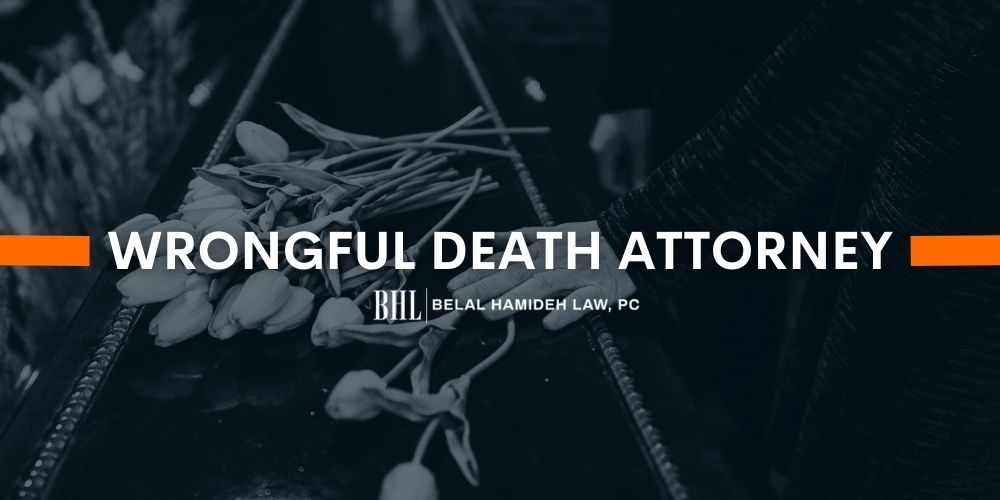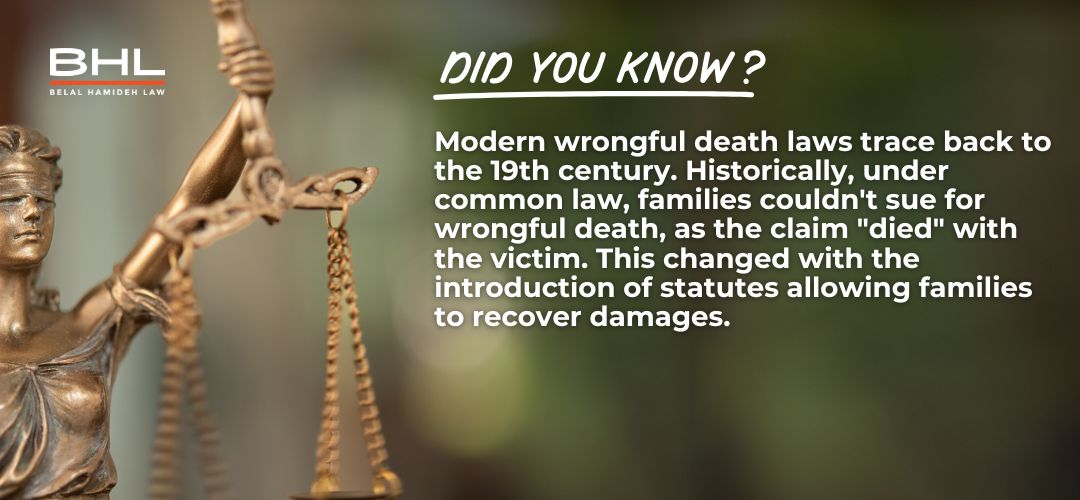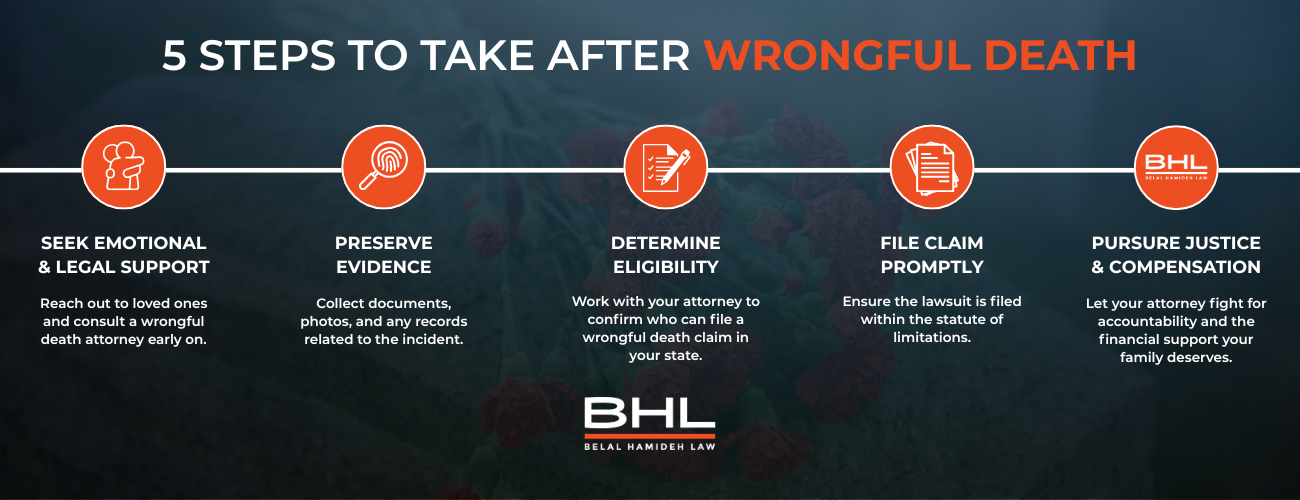
Losing a loved one is a painful experience, one that is made even more devastating when you know that death could have been prevented if someone else had not acted negligently. California’s wrongful death law allows certain family members to demand accountability. A compassionate wrongful death attorney in Long Beach, California from Belal Hamideh Law, P.C. can guide you through the legal process and help you demand justice and accountability through the legal process.

How a Wrongful Death Attorney Can Help
If you unexpectedly lost a loved one due to someone else’s actions, we know that no amount of money can ever fairly compensate for your loss. Yet, holding responsible parties accountable can help bring families a sense of justice. At the same time, a successful wrongful death claim can help provide much-needed financial relief when you need it most.
An experienced wrongful death lawyer can help by:
- Thorough Investigation of the Wrongful Death: Uncovering the complete truth is essential to receiving the compensation you deserve. Whether the death resulted from a car accident, medical malpractice, or workplace negligence, Belal will gather critical evidence such as police reports, medical records, witness statements, and expert testimonies to establish liability and strengthen your case.
- Identifying All Liable Parties: Wrongful death cases often involve multiple at-fault parties. For example, a fatal car accident may involve a negligent driver, a vehicle manufacturer, or even a government entity. Belal analyzes every detail to ensure every responsible party is held legally accountable under California’s wrongful death statute.
- Assessing the Full Value of Your Claim: Families are often entitled to compensation for medical expenses, funeral costs, lost income, and non-economic damages like loss of companionship. Belal assesses your past, present, and future damages to pursue maximum compensation, ensuring insurance companies don’t offer settlements that fall short of your long-term needs.
- Handling Insurance Companies and Negotiations: Dealing with insurance adjusters while grieving can be overwhelming. Insurers often try to minimize payouts or deny claims outright. Belal handles all communications and protects your rights, negotiating aggressively on your behalf to secure a fair settlement.
- Meeting Strict Legal Deadlines: In California, wrongful death lawsuits must typically be filed within two years of the date of death. Missing this deadline can permanently bar your family from seeking justice. Belal ensures all paperwork is filed correctly and within the required timeframe so you can focus on healing.
- Providing Compassionate Guidance and Advocacy: The emotional toll of loss makes legal complexities even more difficult to navigate. Beyond legal expertise, Belal Hamideh provides personalized support, tailoring a strategy to your unique circumstances. Whether through a settlement or by advocating for your rights in front of a judge and jury, he stays by your side every step of the way.
Our Long Beach personal injury law firm offers a free consultation where we can discuss your legal rights and options moving forward.
What Is a Wrongful Death Under California Law?
California law allows certain individuals to file a wrongful death claim if the death of a person was “caused by the wrongful act or neglect of another.” Under this definition, a wrongful death claim could follow an intentional act, such as murder, or a negligent act, such as a car accident.
Why Should I File a Wrongful Death Case If There’s Already a Criminal Case?
In some circumstances, the same facts that could support a criminal case can also support a civil action. For example, a person could drink and drive, causing a fatal crash. They could be subject to criminal penalties since they violated criminal law, while they could also be held financially responsible for wrongful death damages.
Criminal and personal injury cases serve different purposes and have different standards of proof.
Criminal cases are designed to punish the defendant for breaking the law and deter similar conduct in the future, making an example of the defendant. Personal injury cases are focused on making the victim “whole” again. While this isn’t possible in wrongful death cases, the court is limited in the legal relief it can provide, focusing on awarding financial damages to survivors that the defendant is responsible for paying if found responsible.
Because someone’s freedom is at stake in a criminal case, the burden of proof is at its highest, proof beyond a reasonable doubt. The burden of proof in a wrongful death case is by the preponderance of the evidence, meaning that it is more likely than not as the plaintiff alleges. This can allow for the possibility of someone being acquitted in criminal court but being held liable in civil court.
For many people, filing a wrongful death case is the only way to secure some semblance of justice. Our wrongful death attorneys can carefully guide you through the legal process.
Common Causes of Wrongful Death
Wrongful death can occur in many circumstances, including:
- Car accidents
- Truck accidents
- Motorcycle accidents
- Bus accidents
- Bicycle accidents
- Pedestrian accidents
- Slips and falls
- Wildfires
- Dog bites
- Child abuse
- Nursing home abuse
- Elder abuse
- Defective products
- Environmental contaminants
- Workplace injuries
Contact our personal injury law firm today for a free consultation to discuss your legal rights and options.
What Damages Can Our Family Recover After a Wrongful Death Case?
California wrongful death damages provide compensation for economic and non-economic losses caused by the death, including:
- Final medical expenses, including emergency treatment, ambulance rides, and hospitalization
- The victim’s lost income, including the income they would have earned during their period of hospitalization, as well as their future loss of income they were reasonably expected to have earned during their lifetime
- Funeral and burial expenses
- Loss of consortium and sexual relations
- Loss of companionship, love, community, affection, moral support, training, guidance, and other emotional losses
Wrongful death claimants are not entitled to damages for their own pain and suffering. However, they might be granted punitive damages when the defendant is convicted of felony murder. Punitive damages are intended to punish the defendant rather than compensate the family members of the decedent. Courts may award these damages to deter similar behavior in the future.
Who Can File a Wrongful Death Claim in California?
California’s wrongful death statute specifies who can file a wrongful death claim in the state, which includes the following:
- The decedent’s surviving spouse, domestic partner, children, and grandchildren of deceased children
- The surviving spouse or domestic partner and others who would be entitled to the decedent’s property if they left no will, if there are no surviving children or grandchildren
- The parents of the decedent, if they would otherwise be entitled to bring the action, or the decedent’s legal guardians if the parents were deceased
- Individuals dependent on the decedent, including their putative spouse, children of the putative spouse, stepchildren, parents, or legal guardians of the decedent, if the parents were deceased
- A minor who resided in the decedent’s household for 180 days before the death and was financially dependent on the decedent for at least one-half of their support
A Long Beach wrongful death attorney from our firm can review your situation and explain if you are within the group of people who have a valid right to file a wrongful death claim.
What Is the Statute of Limitations in California Wrongful Death Cases?
The statute of limitations refers to the time frame within which a person must take certain legal action. For wrongful death cases, surviving family members must typically file their lawsuit within two years of their loved one’s death.
However, some exceptions can increase or decrease the amount of time a family has to file a wrongful death lawsuit, such as if a government agency was responsible for the death or when the cause of death is not immediately apparent.
The family must file their lawsuit within the applicable statute of limitations; otherwise, they may forfeit their right to file this type of case. You can learn more about the time limits in your case by calling Belal Hamideh Law, P.C. for a free, no-obligation consultation.
FAQs
How Long Will My Wrongful Death Case Take?
Every wrongful death claim is different. How long your particular case might take will depend on factors such as:
- How long the criminal investigation takes, if any
- The strength of your evidence
- Whether the defendant or the insurance company representing their interests disputes liability
- Whether your loved one contributed to the death
- Whether your case goes to trial or ends in a settlement
At Belal Hamideh Law, P.C., our wrongful death attorneys focus on securing the best possible outcome for your case and protecting your long-term interests. We won’t rush the process, but we do stay mindful of your financial needs.
Will My Wrongful Death Case Go to Trial
Many wrongful death and personal injury cases ultimately settle, making a trial unnecessary. However, taking a case to trial may be the best way to secure maximum compensation. Our compassionate wrongful death lawyers can strive to negotiate a fair settlement and then advise you on whether it’s in your best interests to accept it or proceed to trial. Either way, you will have a fierce advocate in your corner, protecting your rights.
Belal Hamideh Law, P.C. has a 99% success rate. Whether your case ends at the negotiating table or in the courtroom, you can trust us to honor your wishes and fight relentlessly to pursue the justice you deserve.
How Is the Compensation from a Wrongful Death Case Allocated?
While some states divide wrongful death awards according to the rules of intestacy (the rules followed when a person does not have a will), in California, it’s generally up to the family to determine how to divide the proceeds from a wrongful death case among themselves. If they cannot reach an agreement, the court may decide how to divide the proceeds, typically allocating a greater share to the family members who were closer to the decedent.
How Much Does a Wrongful Death Lawyer Cost?
Some families are hesitant about filing a wrongful death lawsuit because they are concerned that they cannot afford legal services, especially when they are already facing financial distress due to unexpected medical bills, funeral expenses, burial costs, and lost income. However, our personal injury lawyers work on a contingency-fee basis, so we don’t charge any attorney fees upfront. Instead, we are paid a percentage of the compensation we recover on your behalf. If we don’t win, you don’t pay attorney fees.
This fee arrangement lets you secure legal representation when you need it, but you don’t have to pay for it until we deliver results. Learn more about how we can help when you call for your free, no-obligation consultation.
Contact Our Law Office Today for a Free Consultation
If you recently lost a loved one under circumstances you think might qualify as a wrongful death, a Long Beach wrongful death lawyer from Belal Hamideh Law, P.C. can discuss your situation in a confidential setting. We want to help protect your family and your loved one’s legacy. Contact us today to get started with a free case evaluation.

